- Home
- Donald McCaig
Canaan Page 2
Canaan Read online
Page 2
Cut Nose hoisted his loincloth at the Washitu, to show his disdain.
Others Santee sang their names, and the names of those they loved.
These softer tunes prevailed over Cut Nose’s defiance and hooded men groped for the hands of the men nearest them. One old man stretched out his hands as far as he could reach but failed to touch anyone.
The Seizer drum rolled angrily as the hangman set each man’s noose.
A Washitu whose wife and children had been killed stepped forward with a long knife. He sawed through a rope until all the traps banged open and the Santee were hanged.
The Washitu made a noise like wind sighing over the lake.
Some Santee hung like stones, some spun. One rope broke and the dead Santee was lifted onto the scaffold and hanged again.
I thought that the Washitu killed to make order, that Mrs. Reverend Riggs would have killed rather than eat an improperly boiled egg.
After the Santee had hung long enough, the Washitu cut them down and stacked them in wagons and drove them to the riverbank for burial.
Reverend Riggs asked me for Red Leaf’s Low Dog cape for his cabinet of indian curiosities.
“No,” I said. Had I known that Red Leaf’s dreaming came with the cape, Riggs could have had it.
That night I walked to the riverbank to find my father and take him to a burial platform. I had stolen a butcher knife from the Mission to lay beside his body. It was the only weapon I could find.
But when I came where the Santee had been buried, Washitu medicine men were digging them up by lantern light. When they unearthed a body, they threw it into a wagon or tied it across a packhorse and took it away.
Some of these medicine men had come to the mission and drunk coffee with Reverend Riggs and Mrs. Reverend Riggs.
I did not know what the Washitu medicine men wanted with the dead Santee until Low Dog made me dream of Washitu medicine men boiling the Santee in great iron hog kettles until flesh floated off their bones.
I prayed to JesuChrist that I might never dream again, but JesuChrist did not answer. I have come to believe that despite His mighty powers, JesuChrist cannot quench Low Dog’s desire to know what he does not need to know.
Later, when I was living with my brother White Bull on the Tongue River near the Montana Road, the whiskey trader Pommerlau told me the Washitu medicine men had wired the boiled Santee bones together into skeletons to show their apprentices how a man is made.
CHAPTER 1
TWO TAN EGGS
THE ONE-ARMED CONFEDERATE MAJOR THREADED HIS RIB-SPRUNG horse through the ruins of Petersburg, Virginia. Shell holes pocked once-handsome brick houses. A Union cavalry squadron trotted past, casting early-morning shadows on the rubble piles. The major turned into an alleyway to a familiar garden gate. Deftly, he flipped the reins over gateposts worn from similar use. As he came down the path, two small Leghorns fluttered and squawked chicken alarms, the back door opened, and a young woman stepped into the sunlight.
She shook her head from side to side as if doubting her eyes.
“Well, Sallie . . .”
Though the major was young, his wounds had etched years into his face and his eyes flickered with weariness and pain.
“Oh, Duncan . . .” she gasped as if long-held breath could, at last, safely be released. “I feared . . .”
“Thomas Byrd, he got through without a scratch. That boy is heading home at the double-quick.” He removed his gray slouch hat and dropped it beside the path and pressed her against his chest and buried his face in her hair. “It was a near thing,” he muttered. “God Damn, if it wasn’t a near thing.”
She pushed him to arm’s length and searched his countenance. Her lively face suddenly fragmented.
“Don’t weep, dear heart. You needn’t weep ever again.”
Sallie sniffled and rubbed her eyes and announced that she had no handkerchief. Nor, alas, did he, which occasioned more tears—laughing tears—as she wiped her face on her apron.
Sallie Gatewood was short, dark-haired, and possessed an independent turn of mind. Her husband Duncan’s easy grace had been sobered by four years of war.
“I’ve some yankee coffee.” Duncan Gatewood smiled. “One day we were trying to kill ’em, next day we were eating their rations.”
Their rooms were the kitchen and back bedroom of a house whose front half had been made uninhabitable by shells during the nine-month siege of Petersburg. The northwest corner of the house was in the rubble pile across the street.
Every morning during the final weeks of that siege, Major Gatewood had left this nest for General Mahone’s staff while his bride took a train into Richmond, the beleaguered Confederate capital, to work with the wounded.
Mrs. Duncan Gatewood’s kitchen contained a wooden table, a bench, an iron cookstove, and shelves supported by loose bricks upon which rested several chipped bowls, plates, and two blue willow cups of different manufacture. The wooden box that served as pantry had once contained “1000 Balls, 58 Calibre, U.S.” A translucent white bowl with a hairline crack from rim to foot was the deal table’s centerpiece. It held two smallish tan eggs. The mullioned window faced the garden where the eggs’ providers scratched for insects.
After four years’ intimate acquaintance with Death, Death was banished from their company and the couple were lighthearted as children. Duncan held an egg to the light. “I believe I have never before truly considered the egg. It is entirely smooth without slipperiness. What a shapely creation!”
“They are hard-boiled, dear husband. If you sit, I will remove the shell and you may feast upon them.”
“I am feasting upon you,” Duncan said. Which not-quite-innocent remark produced her blushes. While eggs and coffee waited, the two repaired to their bedroom for an intimacy that seemed novel each time they embarked upon it.
Afterward, she traced the burn scar his sparse beard partially concealed. “Dear Duncan,” she said. “My dearest, dearest . . .” Under her touch his smile trembled. “I am so grateful you weren’t taken prisoner. The Federals who captured our Winder Hospital took all our poor boys prisoner. Surgeon Chambliss and Lane too. For a moment I feared Cousin Molly Semple and I would be captured.”
“No telling when those poor bastards will be coming home.”
“But the War is over.”
“It’s over when the Federals say it’s over. Jeff Davis is still on the run.”
“But General Lee has surrendered.”
“Yes, ma’am. He has.”
“And my Darling Husband is paroled, never to fight anymore.”
Tenderly, he touched the slope of her breast. “We are free to go where we will.”
“Must we go? Cannot we remain here and”—Sallie smiled—“feast upon one another?”
SALLIE AND DUNCAN HAD KNOWN each other since childhood. Sallie’s schoolmaster father, Uther Botkin, had taught Sallie and Duncan and, though it was illegal under Virginia law, he had taught the negro Jesse Burns too.
When the slave girl, Maggie, bore fifteen-year-old Duncan’s child, Duncan’s father, Samuel, had sold mother and child south. Even now, five years later, neither Duncan nor Samuel mentioned the affair. The hurt was too fresh.
Sallie had married, but her husband disappeared in the war.
When the badly wounded Duncan was brought to Winder Hospital, the childhood friends were reunited. It was not too much to say—certainly Duncan believed—that Sallie’s nursing saved his life. They married.
Restored to duty, Sallie’s husband followed General Lee on that final, forlorn Confederate retreat while Sallie waited in this sunny kitchen, which she contrived to make agreeable with strands of herbs hanging over the table, bay leaves curling as they gave up their fragrance on the woodstove, and three tulips, two yellow, one scarlet, sprouting from the mouth of a wooden canteen beside the door.
Now the smug cackles of the Leghorns accompanied the music from the bedroom as Duncan and Sallie took pleasure behind these ruined walls from
which war was banished; in which generosity prevailed and anger and disgrace lay abandoned outside the door.
LATER, AS HER HUSBAND SLEPT, Sally snipped the insignia from his gray military collar and replaced every CSA button with a button of plain bone.
STILL LATER EACH ATE an egg and drank a cup of yankee coffee. They spent the afternoon in speech and touch and silence.
Sometime after midnight they were wakened by shouts, galloping horses, and torches in the street. President Lincoln had been shot.
CHAPTER 2
LETTER FROM SAMUEL GATEWOOD TO SERGEANT JESSE BURNS, 23RD INFANTRY, UNITED STATES COLORED TROOPS
STRATFORD PLANTATION,
SUNRISE, VIRGINIA
MAY 24, 1865
Dear Fesse,
I was gratified to receive your communication of May 6th. Franky and Jack, your old driver, send warm regards. Sallie, the child who studied her McGuffey’s under your first master, Uther Botkin—little Sallie has wed my son Duncan. Though frightfully wounded in the recent conflict, Duncan has come home. My son-in-law, Catesby Byrd, died at Spotsylvania and not long afterwards my dear, dear daughter Leona joined her husband in Paradise. My grandson, Thomas, is reading for the law in Staunton with Mr. Alexander Stuart, Secretary of the Interior under President Fillmore and a devoted Union man, Stuart opposed secession and seeks to heal the wounds of this dreadful war.
It was bitter to find our trusted servants in the Federal armies arrayed against us. Tell me, Jesse, was I such an unkind master?
Last winter, Aunt Opal and my houseman Pompey took up residence in Uther Botkin’s former home. I tried to dissuade them but they were heedless. More runaway Coloreds took refuge there and the establishment fell into disrepute. Its occupants were blamed for numerous petty thefts. These Coloreds showed none of the respect they had once so freely rendered. Consequently, one night, vigilantes descended upon them. When Pompey defied them with a shotgun he was shot dead. After they torched Uther Botkin’s home, Aunt Opal returned to Stratford.
The hand of God’s Providence lies heavily upon the South. Most of our servants are gone and Stratford is impoverished. I fear that God has judged us for our stewardship and found us wanting; I, not least among my fellows. Our neglect of morality and the integrity of negro families has delivered us into the hands of our enemies.
You wrote to ask particularly of your wife Maggie’s whereabouts and it grieves me to confess I do not know. Your wife Maggie and infant son, Jacob, were given over to Silas Omohundru, the slave speculator, and how Omohundru disposed of them, I never asked. Omohundru was killed in the final days of the war.
Though I would gladly help you reclaim what you have lost, I cannot. There is much these days I would reclaim, little I can.
Your Old Master,
Samuel Gatewood
CHAPTER 3
LOW DOG DREAMING
I asked Low Dog, “Have you no others to dream for you?”
I dreamed of Lakota villages burning, dreamed of blue soldiers falling from the sky. My dreams tumbled over one another like a mountain stream. I woke wearier than when I closed my eyes.
When the surviving Santee started moving west, I walked with them, ate what there was to eat, hungered when there was nothing. I walked many miles to outrun Low Dog, but every night when I closed my eyes he was there, grinning. “Ah,” he said, “so there you are.”
I dreamed of the Seizers warring among themselves, of cities burning and so many corpses they carpeted the ground.
The Washitu are merciless. Even to their own.
I passed through country that had belonged to the Ree before the Lakota took it. I passed through the Powder River, which had been Crow country.
On the Tongue River my brother White Bull and his wives, Rattling Blanket Woman and Fox Head, welcomed me. When I closed my eyes that night in their lodge, I did not dream.
But the next night, Low Dog took me far away to a great Seizer village where they were celebrating the Northern Seizers’ victory over the Southern Seizers.
Dream Seizers paraded before me like blackhorns on the plains; so many, they took two days to pass. I could not count their horses and iron cannons.
Down a broad road between white marble dwellings they marched, and their bands played Seizer music and Seizer drums said “rat-a-tat-tat.”
I woke in my brother’s lodge weeping. White Bull was a great warrior and feared by our enemies. But White Bull could not save me from Low Dog dreaming.
White Bull’s sits-beside-wife, Rattling Blanket Woman, was stirring the fire. Rattling Blanket Woman made beautiful moccasins and I loved her as a sister. Her deft hands could not stay my Low Dog dreams.
I told my brother I must go somewhere else. I must find someplace where Low Dog could not find me. I said I would die from my dreaming and could not stay with the Lakota anymore.
CHAPTER 4
A BIG PLUM
THE GRAND ARMY OF THE POTOMAC HAD PARADED YESTERDAY: spit and polish, one-two, one-two; ten in the morning until five at night; a hundred forty thousand men saluted the reviewing stand: General Grant and General Meade and President Johnson and the Honorable Thaddeus Stevens and top Republican congressmen. The only lively moment came when General Custer lost control of his stallion—trust Custer to ride a stallion in a parade—and he galloped down Pennsylvania Avenue with his yellow hair streaming behind him. He saluted the reviewing stand as he passed.
Today was the Army of Tennessee’s turn.
General William Sherman (Uncle Billy) didn’t order his soldiers to spruce up nor polish their boots, and those that didn’t have shoes, why, they weren’t issued any. And the colored gals who’d followed them through Georgia and the Carolinas were following ’em today. There were hundreds of bird dogs—some of the best bird dogs in the South—running loose and squabbling. There were thoroughbred horses with their previous Confederate owners’ names painted on their flanks. There were fine purebred cattle and sheep and even two Cape buffalo liberated from the rebel General Wade Hampton’s private park. How the brave boys cheered! How they sang! “As we go marching through Georgia!”
Reclining on the Capitol Mall, picnic basket beside him, Eben Barn-well had enjoyed every patriotic aspect of Sherman’s victorious, yet so human army, and when pretty schoolgirls started pelting the veterans with flowers, Eben Barnwell began to weep. Those carefree children primed his melancholy. From weeping, Eban began to gasp and dropped his face into his hands. No! He was not that frightened boy! He was not him anymore!
After he recovered, Eben wiped his face with his handkerchief and invited several soldiers to “have a drink with a grateful citizen. You, sir”—indicating a dour civilian beside a soldier—“if you’ve befriended these fine boys, you’ve befriended me.”
Shortly afterward in Ebbett’s Saloon, Eben Barnwell hoisted his glass. “I give you the Union, gentlemen! One and indivisible!” Flushed from the sun, Eben’s countenance was wreathed in smiles. What a grand parade! In this glorious, optimistic America, what parade could compare? “To patriots!” he added.
“Damn all rebels!” Mr. Charles Chepstow amended. A small-chested man with large buttocks, Mr. Chepstow’s expression was as low as his center of gravity. Chepstow was Private Hayward’s kinsman.
“I am so very very happy!” Eben beamed.
The small party perched behind the mezzanine railing above a turbulent sea of blue backs, blue trousers, and blue forage caps. This dominant scheme was speckled with gray and brown civilians like toast crumbs floating on the blue ocean. Eben’s raised finger secured a harried waiter’s attention.
Sergeant Wilson’s tobacco stream left the spittoon largely untouched and his voice slurred. “Are you one of them profiteers, Barnwell?”
“I admit it, brave boys. Readily, I admit it. Whilst you brave boys faced mortal perils, I purveyed blankets to the Army of the Potomac. None of your shoddy! No, sir! If I exacted a fair price, I delivered a warm blanket.
“A substitute served in my plac
e. A new arrival to our fair shores, Mr. Phineas Ryan, accepted my price, fought as you did, marched as you did, and fell in my stead at Little Round Top. Gentlemen, if I did not fight bravely—as you did—my money fought and died as gallantly as six hundred honest dollars ever could!”
Corporal Smithers grinned like a fool. Though Private Hayward kept his eyes fixed on Charles Chepstow, his kinsman ignored him.
“Boys, you see me as I am. One would not call me ‘fat,’ but I confess to ‘portly.’ My constitution is robust, but I dare say any of you could throw me.
“Boys, to my disgrace, I confess that Eben Barnwell is not . . . Eben is not valorous. When Jubal Early’s confederates neared Washington—was it just a year ago?—my portmanteau was loaded atop my carriage, my servant slept fully dressed, and I had rooms reserved in Baltimore.
“Valiants like yourselves deride cowards like Eben Barnwell, but would you enlist him?” Eben’s hands framed his verbal picture. “You are in ranks as the sun rises through the fog. Ahead: the dreadful redoubt of the implacable foe. In your breast pocket: the Testament your mother pressed upon you the day you enlisted. Inside that Precious Book: a tearstained letter to your sweetheart—inscribed ‘to be delivered in the event . . .’ ” Eben’s shudder amplified this detail. “Look sharp, boys! The bugle sounds! Your captain cries, ‘Load your rifle! Fix bayonets!’ But take comfort, boys! On your right hand—why it’s Sergeant Wilson—a lion of a man. On your left—Private Hayward. Now, Hayward may have his head in the clouds, but when the drum rolls he’s present for duty. In the second rank—why, it’s Corporal Smithers—perhaps Smithers is too familiar with ‘masked batteries’ ”—Wilson guffawed while Smithers reddened—“but brave Smithers will assault Confederate batteries as readily as the battery beneath a bawd’s skirts.”
Sergeant Wilson put an elbow into Smithers’s ribs. “Ha!” he said.
“Boys, which of these brave fellows would you swap for portly, puffing, frightened Eben Barnwell? Eben’s money will rush in where Eben will not. Eben’s money is valorous, and as you surmount the rampart, at your side, fluttering beside our glorious flag, will be Eben Barnwell’s bloodstained, battletried greenbacks!”

 Eminent Dogs, Dangerous Men: Searching Through Scotland for a Border Collie
Eminent Dogs, Dangerous Men: Searching Through Scotland for a Border Collie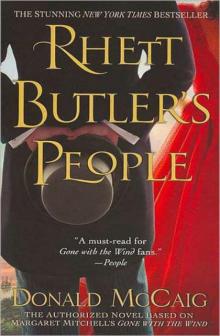 Rhett Butler's People
Rhett Butler's People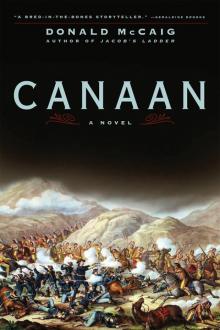 Canaan
Canaan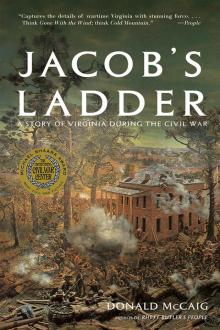 Jacob's Ladder: A Story of Virginia During the War
Jacob's Ladder: A Story of Virginia During the War Nop's Hope
Nop's Hope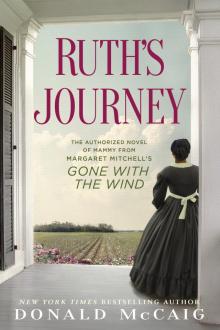 Ruth's Journey: The Authorized Novel of Mammy From Margaret Mitchell's Gone With the Wind
Ruth's Journey: The Authorized Novel of Mammy From Margaret Mitchell's Gone With the Wind Nop's Trials
Nop's Trials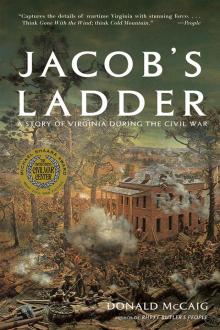 Jacob's Ladder
Jacob's Ladder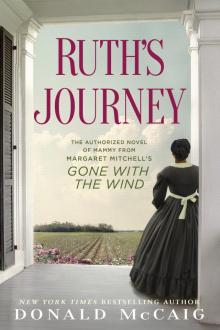 Ruth’s Journey
Ruth’s Journey Eminent Dogs, Dangerous Men
Eminent Dogs, Dangerous Men